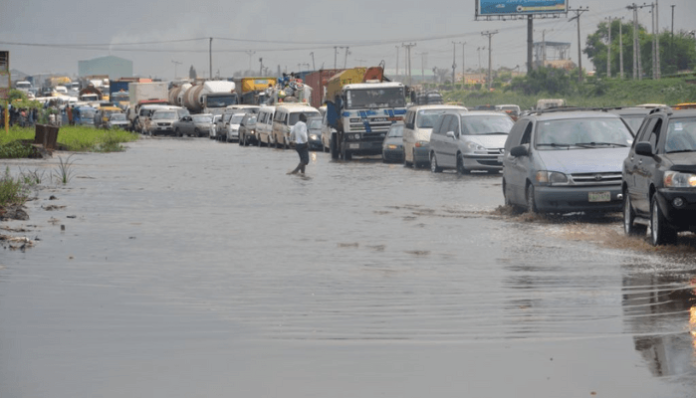BY TONY UDOKA
The Federal Government on Tuesday, suggested that increased rainfall, accentuated by climate change and Mokwa’s swollen river plains, triggered the flash floods that devastated the market town, not the structural integrity of the Kainji or Jebba Dams, as widely speculated.
The Minister of Water Resources and Sanitation, Professor Joseph Utsev, who briefed the press in Abuja, clarified that preliminary assessments point to torrential rainfall and the blockage of natural waterways by unregulated developments as the root causes of the devastating flood that struck Mokwa in the early hours of Thursday, 29 May.
According to him, both the Kainji and Jebba Dams remain structurally sound and fully operational.
“We want to categorically state that the flood was not caused by water releases from either the Kainji or Jebba Dams. Both dams are safe.
“This incident was the result of heavy rainfall exacerbated by the effects of climate change and poor urban planning, particularly the obstruction of an ephemeral tributary of River Dingi,” Utsev said.
Alarmed by the ferocity of the flash flood, some residents of Mokwa who spoke to reporters attributed the disaster, which reportedly claimed over 152 lives, to a possible collapse of one of the dams in Niger State, which they feared officials might not be aware of.
Niger State is home to three major dams — Kainji, Jebba and Shiroro, while a fourth is currently under construction.
According to some residents, there could be “a bigger problem upstream”, including a possible dam collapse that had gone unnoticed. The Niger State Emergency Management Agency (NSEMA) initially put the death toll at 152.
The agency further stated that at least 3,018 people had been displaced, 265 houses destroyed, and two bridges washed away by the floods.
The Minister said technical teams from relevant agencies, including the Nigeria Hydrological Services Agency (NIHSA), the Upper Niger River Basin Development Authority (UNRBDA), and the National Water Resources Institute (NWRI), are currently on the ground conducting a thorough assessment.
Utsev disclosed that the incident had already been foreseen in the 2025 Annual Flood Outlook (AFO), which was released in April. The report had identified 19 Local Government Areas in Niger State, including Mokwa, as high-risk zones, warning of likely flooding due to intensified weather patterns.
“The 2025 AFO had already indicated that 1,249 communities across 176 LGAs in 33 states and the FCT fall within high flood-risk areas. Mokwa was not an exception. We must begin to treat these forecasts with the seriousness they deserve,” he stated.
He reiterated the Ministry’s earlier recommendations for flood mitigation, which include strengthening drainage infrastructure, relocating vulnerable communities, enforcing land-use regulations, and sustaining public awareness campaigns.
The Minister urged citizens, local authorities, and stakeholders to consult the NIHSA flood forecast dashboard for detailed, localised risk assessments and to adopt proactive measures.
While expressing concern over the increasing frequency and intensity of flooding across Nigeria, Utsev noted that climate change remains a major driver of extreme weather events, now posing a direct challenge to national infrastructure and community resilience.
“This is not just an environmental issue; it’s a developmental one. Flooding affects lives, livelihoods, and infrastructure. We must work together across sectors and at all levels of government to build resilient communities,” he stated.
As part of its ongoing response, the Ministry pledged technical and advisory support to Niger State and other flood-prone regions, and called for strengthened collaboration between federal, state, and local institutions.
In the aftermath of the disaster, Niger State Deputy Governor, Comrade Yakubu Garba, reportedly disclosed that about 1,000 people were still missing, while over 150 bodies had been buried following the flood in Mokwa Local Government Area of the state.

